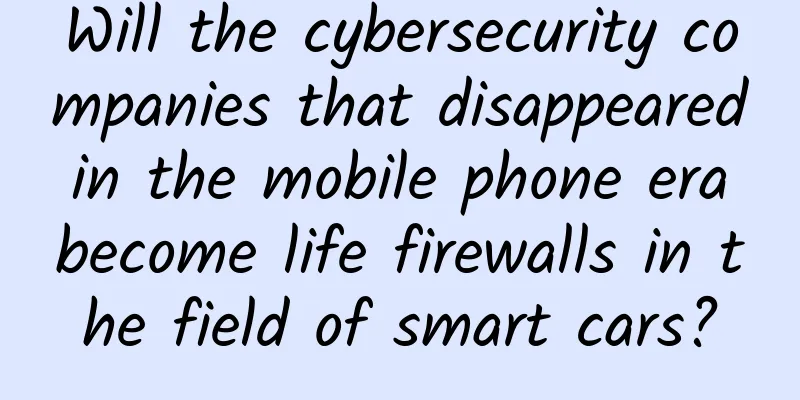Will the cybersecurity companies that disappeared in the mobile phone era become life firewalls in the field of smart cars?

|
Earlier this month, a piece of news once again aroused public concerns about cybersecurity issues: Colonial Pipeline, the largest fuel pipeline company in the United States, was attacked by hackers and was forced to pay a ransom of 90 million US dollars to the hackers. In this incident, the hacker group that did not show up was able to control such a huge fuel pipeline company simply through the Internet and temporarily shut down its core fuel network. This kind of "network affecting reality" is no longer uncommon, and the importance of network security to modern industries is self-evident. However, the security vendors that have a close relationship with it have gradually lost their voice in recent years as they have gradually shifted from the C-end to the B-end. The stock prices of some listed security companies have also continued to decline, and their profits are much lower than before, and they no longer have the glory of the past. However, the smart car industry, which has become increasingly hot recently due to the entry of many Internet companies, has opened a window for network security manufacturers, a window that will allow network security manufacturers to shine again in the era of smart cars. Smart car industry security risks are extremely intensified Since the rise of the new energy brand Tesla, the concept of smart cars has become known to the public. The so-called "smart" means that the car can independently complete driving-related operations without the control of the owner, including automatic driving, automatic parking and automatic braking. Smart cars are essentially the product of the deep integration of IT technology and traditional cars. Based on the original hardware, they integrate software to achieve innovation in the way cars are driven. Although such products have brought consumers a refreshing control experience and driving has gradually become easier, they have also brought new risks to the automotive industry. According to data from the European Union's cybersecurity agency, the number of attacks on smart cars, including sensor and data center attacks, has increased dramatically; Tesla's proud car system has also been hacked many times by 360 and Tencent security personnel. Unlike traditional networks, when a computer encounters a virus, the most it will suffer is the loss of files. However, if hackers hack into and control a car, it is no longer a smart car, but a killing tank remotely operated by hackers. Industry analysis agencies have given data that the global smart car market size may reach US$7.03 billion this year, and global smart car sales are expected to reach 21 million in 2035. While such high sales volume highlights the prosperity of the smart car industry, it also lays a lot of hidden dangers for its safety issues. The rising sales of smart cars will gradually turn them into a mass product that every household has. The expansion of the market size is bound to attract the attention of hackers. Moreover, since cars have the attribute of providing private space, hackers can also obtain the owner's private information by invading the car system. At that time, smart cars will become an important way for hackers to steal private information, and cyber attacks on cars will be as common as cyber attacks on computers today. In the post-Internet era, smart cars have become a self-help antidote for cybersecurity vendors After network security vendors almost ended PC viruses by making anti-virus software free, they also lost the ability to make profits from their main business in the C-end market. The anti-virus market has become an "involutionary" Shura field. The anti-virus capabilities that they are proud of cannot bring them any profits, but if they do not continue to invest resources to improve their technology, they will only hand over the market they have already occupied to others. However, as Microsoft also launched the official antivirus software "Windows Security Center" on Windows 10, its two major features of "pre-installed + free" further eroded the market share of third-party security vendors in the PC field, and network security vendors are having a harder time. In the era of mobile Internet, smartphones have become the core of people's lives and have also mastered a large amount of user data. Such high-value data carriers have unsurprisingly become an important target for hackers, but smartphone manufacturers, relying on their high degree of control over mobile phones, have isolated the possibility of viruses infecting mobile phones from both software and hardware aspects, making it extremely difficult for third-party software to obtain system permissions. However, while mobile phone manufacturers are protecting users, they are also severing the security vendors’ dream of rebuilding their PC-era status in the mobile market. Third-party antivirus software that cannot obtain core system permissions ultimately causes security vendors to miss out on the prosperous mobile Internet era. It is no exaggeration to say that the situation of network security vendors on the C-end has reached an extremely dangerous bottom. One step back would be the abyss. Fortunately, the rise of the smart car market has provided network security vendors with a stage to display their skills in the next technological explosion field. Although the Internet car-making forces are very loud nowadays, the main force in the current car market is still traditional car manufacturers. However, although traditional car manufacturers have a long-term technical accumulation in car manufacturing and have unique design concepts for car model safety, these advantages cannot be fully transferred to the software security of smart cars. Take Jeep as an example. In 2015, two security experts hacked into the car system of a Cherokee and were able to freely activate various functions of the car. This is the time for network security companies that have no experience in hardware manufacturing but have rich experience in network security and virus attacks to take the stage. With years of hard work, well-known security vendors including Kaspersky and 360 have accumulated security attack and defense experience in various operating systems. Both their talent and security data are at the leading level in the market. Therefore, choosing to enter the smart car industry as soon as possible will be the best opportunity for security vendors to return to the C-end market and deepen their B-end layout. It will also enable them to seize the initiative in the new technology industry singularity and avoid repeating the same mistakes after the Internet car-making forces take over the smart car industry. Inside model guides cybersecurity vendors to enter the car manufacturing market "Automobile intelligence" has become a recognized direction of automobile development in the automotive and technology industries. The broad market prospects of smart cars will inevitably attract more Internet car manufacturers. However, compared with smartphones, the industrial complexity of smart cars has risen to another level, and the number of supply chains involved is far beyond that of smartphones that can even be outsourced. Huawei, which once had a firm foothold in the high-end mobile phone market, also made it clear early in this round of "car-making boom" that "Huawei does not make cars, but helps partners make good cars." This is not Huawei's strategic shortsightedness, but Huawei's clear understanding that its current capabilities are not enough to independently build complete vehicles, so implementing an inside model similar to Intel's PC is the best choice at the moment. The same choice is left for cybersecurity companies that hope to enter the smart car industry and regain their strength. The lack of hardware manufacturing experience makes it difficult for them to start, but their valuable experience in cybersecurity can make them an indispensable software security solution provider for every traditional car manufacturer in the smart car industry. Compared with vehicle manufacturing, the inside model has many benefits for security vendors. First, it is a recognized fact that this model is a security vendor's way of playing to their strengths and avoiding their weaknesses. Second, the inside model means that security vendors can not only provide security solutions for a single vendor's vehicle system, but also transplant them to other vendors' models on the same hardware platform, thereby covering more models and spreading the R&D costs with the revenue from multiple models. In addition to the output of the same solution, manufacturers can also provide different levels of solutions for different levels of vehicle systems, and provide customized security solutions that meet the requirements of the enterprise market, achieving full coverage from C-end to B-end users. With the shrinkage of the original market and the missed opportunity of the mobile era, the main business of network security vendors has gradually shifted to the government and enterprise market. However, due to the high entry threshold and increasing number of competitors in the government and enterprise market, network security vendors are destined to fall into the quagmire of price wars. However, with the rise of the smart car market, security vendors who choose the inside model to enter the market will undoubtedly be able to gain a blue ocean market atmosphere, relying on their own advantages to play to their strengths and avoid their weaknesses, so as to shine again in the "smart car" era, and allow consumers to drive cars that are not only safe and reliable in hardware, but also safe and reliable in software. As a winner of Toutiao's Qingyun Plan and Baijiahao's Bai+ Plan, the 2019 Baidu Digital Author of the Year, the Baijiahao's Most Popular Author in the Technology Field, the 2019 Sogou Technology and Culture Author, and the 2021 Baijiahao Quarterly Influential Creator, he has won many awards, including the 2013 Sohu Best Industry Media Person, the 2015 China New Media Entrepreneurship Competition Beijing Third Place, the 2015 Guangmang Experience Award, the 2015 China New Media Entrepreneurship Competition Finals Third Place, and the 2018 Baidu Dynamic Annual Powerful Celebrity. |
Recommend
Hints for keeping users hooked on APP: Guiding the needs lurking beneath the surface
We talked about the power of habits and how to ke...
Ministry of Public Security: In 2019, the number of private cars in China exceeded 200 million for the first time, and the total number of drivers reached 435 million
According to statistics from the Ministry of Publ...
Welcome the God of Wealth on the 5th day of the New Year|The Gods of Wealth from ancient times to the present, all explained to you in one breath →
It is the day to welcome the God of Wealth on the...
The moon's orbital speed is much lower than the first cosmic speed, so why doesn't it fall from the sky?
This is in response to a question from a netizen....
Our story in Lost on Journey·ET Tribe
[[182181]]...
How to create batches of short videos to sell goods on Douyin!
What we are going to talk about today is the crea...
How to charge your iPhone correctly? Learn these 5 tips to keep your battery healthy at 100%
Click to participate in the 51CTO website content...
If you don’t clean these 4 places on the rice cooker, be careful not to eat “cockroach steamed rice”!
When I was surfing the Internet some time ago, I ...
Xiaomo AE tutorial for beginners from scratch
Course Catalog ├──AECC2019 Software | └──After Ef...
Look! The sun is also "drawing"? It once caused power failure!
Recently, Nature announced the best scientific ph...
Deliciousness and virtue coexist, the ancients' "chicken on the tip of the tongue" actually has so many meanings!
my country is one of the earliest countries to do...
Xbox One major update: game streaming PC compatible with 360
The latest news shows that Microsoft has prepared...
How much does it cost to join the Yichang Photo Mini Program?
How much does it cost to join the Yichang Photo M...
Douyin Operation: Strategies for maintaining a Douyin account and increasing followers!
Douyin accounts, like personal WeChat accounts, n...
This ordinary gas allows us to draw the most beautiful "Galactic Picture"
(This article was first published in "Scienc...







![[Case] After working in operations for so long, have you ever thought about what the value of operations is!](/upload/images/67cc4e1b2ffb8.webp)

